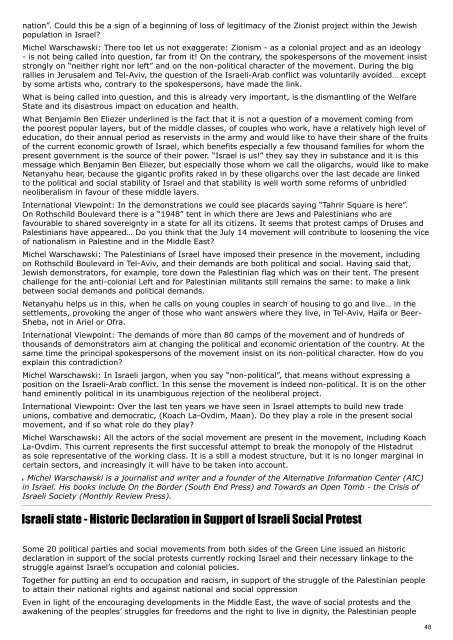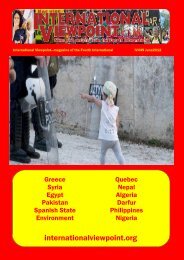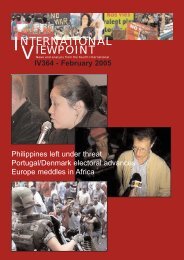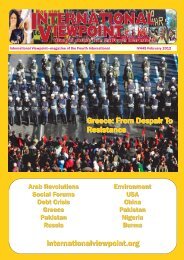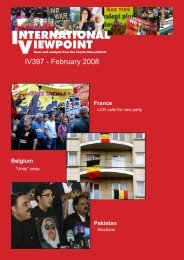here - International Viewpoint
here - International Viewpoint
here - International Viewpoint
You also want an ePaper? Increase the reach of your titles
YUMPU automatically turns print PDFs into web optimized ePapers that Google loves.
nation”. Could this be a sign of a beginning of loss of legitimacy of the Zionist project within the Jewish<br />
population in Israel?<br />
Michel Warschawski: T<strong>here</strong> too let us not exaggerate: Zionism - as a colonial project and as an ideology<br />
- is not being called into question, far from it! On the contrary, the spokespersons of the movement insist<br />
strongly on “neither right nor left” and on the non-political character of the movement. During the big<br />
rallies in Jerusalem and Tel-Aviv, the question of the Israeli-Arab conflict was voluntarily avoided… except<br />
by some artists who, contrary to the spokespersons, have made the link.<br />
What is being called into question, and this is already very important, is the dismantling of the Welfare<br />
State and its disastrous impact on education and health.<br />
What Benjamin Ben Eliezer underlined is the fact that it is not a question of a movement coming from<br />
the poorest popular layers, but of the middle classes, of couples who work, have a relatively high level of<br />
education, do their annual period as reservists in the army and would like to have their share of the fruits<br />
of the current economic growth of Israel, which benefits especially a few thousand families for whom the<br />
present government is the source of their power. “Israel is us!” they say they in substance and it is this<br />
message which Benjamin Ben Eliezer, but especially those whom we call the oligarchs, would like to make<br />
Netanyahu hear, because the gigantic profits raked in by these oligarchs over the last decade are linked<br />
to the political and social stability of Israel and that stability is well worth some reforms of unbridled<br />
neoliberalism in favour of these middle layers.<br />
<strong>International</strong> <strong>Viewpoint</strong>: In the demonstrations we could see placards saying “Tahrir Square is <strong>here</strong>”.<br />
On Rothschild Boulevard t<strong>here</strong> is a “1948” tent in which t<strong>here</strong> are Jews and Palestinians who are<br />
favourable to shared sovereignty in a state for all its citizens. It seems that protest camps of Druses and<br />
Palestinians have appeared… Do you think that the July 14 movement will contribute to loosening the vice<br />
of nationalism in Palestine and in the Middle East?<br />
Michel Warschawski: The Palestinians of Israel have imposed their presence in the movement, including<br />
on Rothschild Boulevard in Tel-Aviv, and their demands are both political and social. Having said that,<br />
Jewish demonstrators, for example, tore down the Palestinian flag which was on their tent. The present<br />
challenge for the anti-colonial Left and for Palestinian militants still remains the same: to make a link<br />
between social demands and political demands.<br />
Netanyahu helps us in this, when he calls on young couples in search of housing to go and live… in the<br />
settlements, provoking the anger of those who want answers w<strong>here</strong> they live, in Tel-Aviv, Haifa or Beer-<br />
Sheba, not in Ariel or Ofra.<br />
<strong>International</strong> <strong>Viewpoint</strong>: The demands of more than 80 camps of the movement and of hundreds of<br />
thousands of demonstrators aim at changing the political and economic orientation of the country. At the<br />
same time the principal spokespersons of the movement insist on its non-political character. How do you<br />
explain this contradiction?<br />
Michel Warschawski: In Israeli jargon, when you say “non-political”, that means without expressing a<br />
position on the Israeli-Arab conflict. In this sense the movement is indeed non-political. It is on the other<br />
hand eminently political in its unambiguous rejection of the neoliberal project.<br />
<strong>International</strong> <strong>Viewpoint</strong>: Over the last ten years we have seen in Israel attempts to build new trade<br />
unions, combative and democratic, (Koach La-Ovdim, Maan). Do they play a role in the present social<br />
movement, and if so what role do they play?<br />
Michel Warschawski: All the actors of the social movement are present in the movement, including Koach<br />
La-Ovdim. This current represents the first successful attempt to break the monopoly of the Histadrut<br />
as sole representative of the working class. It is a still a modest structure, but it is no longer marginal in<br />
certain sectors, and increasingly it will have to be taken into account.<br />
Michel Warschawski is a journalist and writer and a founder of the Alternative Information Center (AIC)<br />
in Israel. His books include On the Border (South End Press) and Towards an Open Tomb - the Crisis of<br />
Israeli Society (Monthly Review Press).<br />
Israeli state - Historic Declaration in Support of Israeli Social Protest<br />
Some 20 political parties and social movements from both sides of the Green Line issued an historic<br />
declaration in support of the social protests currently rocking Israel and their necessary linkage to the<br />
struggle against Israel’s occupation and colonial policies.<br />
Together for putting an end to occupation and racism, in support of the struggle of the Palestinian people<br />
to attain their national rights and against national and social oppression<br />
Even in light of the encouraging developments in the Middle East, the wave of social protests and the<br />
awakening of the peoples’ struggles for freedoms and the right to live in dignity, the Palestinian people<br />
48


